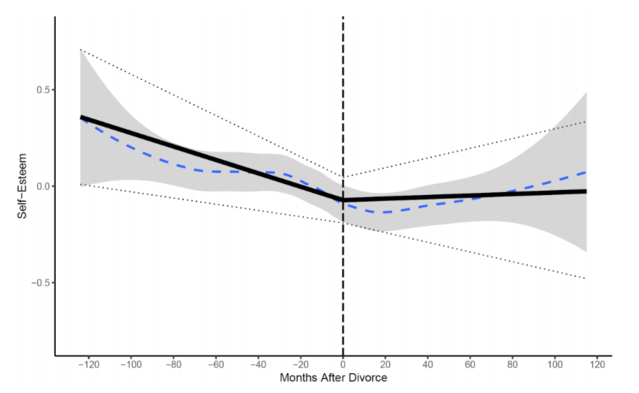Divorce
Is Divorce the Antidote to an Unhappy Marriage?
New research explores the influence a divorce can have on self-esteem.
Posted December 3, 2019 Reviewed by Abigail Fagan

If psychological research teaches us anything, it's that it is impossible to accurately predict how we will feel after an unexpected and life-changing event. Often, the best we can do in these situations is to look to the experiences of others.
New research appearing in the Journal of Personality sought to do exactly that—in the context of marital dissolution and divorce. Specifically, a team of researchers led by Wiebke Bleidorn of the University of California Davis tracked the trajectory of self-esteem in people who were in the midst of a divorce.
Interestingly, they found steady declines in self-esteem in the months leading up to a divorce, followed by slow but gradual increases in self-esteem after the divorce had occurred.
"The dissolution of a marriage is associated with various psychological, social, and economic consequences, many of which are considered aversive, stressful, and potentially even traumatic," state Bleidorn and her team. "Consistent with past research ... the average divorcee in our sample experienced significant decreases in self-esteem. Notably, these decreases occurred during the years approaching marital dissolution, came to a halt during the year of marital separation, and were followed by a stable trajectory during the years following marital dissolution."
To arrive at this conclusion, Bleidorn and her team examined data from the Longitudinal Internet Studies for the Social Sciences (LISS)—a nationally-representative study of Dutch adults spanning 2008 to 2018. The LISS tracked Dutch adults' attitudes and behaviors on a variety of topics. Here, the researchers were specifically interested in self-esteem and marital status.
To get what they needed, the researchers segmented the data to include only individuals who (a) were married at some point during the 10-year study period and (b) experienced a divorce or separation at some point during the test period. This resulted in a final sample of 291 participants.
As part of the LISS' questionnaire, participants were asked to periodically report their self-esteem via a modified version of the 10-item Rosenberg Self-Esteem Scale. Participants were asked to indicate their level of agreement with statements such as, "On the whole, I am satisfied with myself" and "At times I think I am no good at all."
Using this data, the researchers were able to track participants' level of self-esteem for up to 120 months before and after a divorce or separation had occurred. The graph below depicts the average trajectory of self-esteem across the 10-year test period. (Notice that self-esteem declines before a divorce and gradually increases afterward.)

The researchers also found some interesting subtleties in the data. For instance, they found that religious people showed steeper declines in self-esteem in the months leading up to divorce than non-religious people. This, they believe, points to the degree to which societal expectations can shape people's feelings regarding life transitions such as divorce. They also found that people with conscientious personalities (that is, the cluster of traits characterized by carefulness, diligence, and deliberateness) exhibited more self-esteem resiliency in the face of marital dissolution than others.
The researchers also tested whether factors such as a divorcee's gender, age, or attitudes toward marriage and divorce played a role in shaping the relationship between marital dissolution and self-esteem. However, they found no evidence that this was the case. Perhaps especially interesting was that neither length of marriage nor whether the couple had children influenced the trajectory of self-esteem any more than what is shown in the graph above.
The researchers view their results as evidence that divorce, in many cases, can act as an antidote to an unhappy marriage. They suggest that marital separation can "release spouses from the enduring stressors of an unhappy marriage and counteract self-esteem diminishing processes" and can be an opportunity to "invest in other meaningful relationships with family, friends, or new relationship partners, which may provide new sources of support and counteract initial decreases in self-esteem."
However, the authors caution readers against viewing divorce as a panacea. They point out that self-esteem does not appear to quickly, if ever, return to pre-divorce levels.
Facebook image: Skolkokrasok/Shutterstock
References
Bleidorn, W., Schwaba, T., Denissen, J. J., & Hopwood, C. J. (2019). Charting self‐esteem during marital dissolution. Journal of personality.


